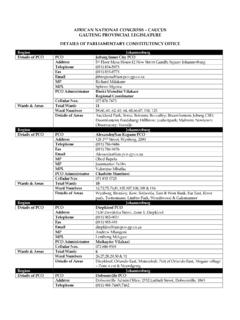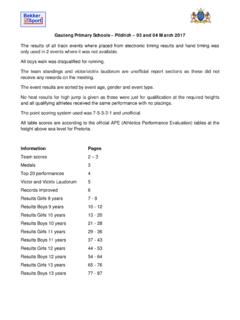Transcription of IN THE SOUTH GAUTENG HIGH COURT …
1 SAFLII Note: Certain personal/private details of parties or witnesses have been redacted from this document in compliance with the law and SAFLII Policy IN THE SOUTH GAUTENG HIGH COURT JOHANNESBURG REPUBLIC OF SOUTH AFRICA CASE NO: 12/10142 REPORTABLE In the matter between: DELETE WHICHEVER IS NOT APPLICABLE (1) REPORTABLE: YES / NO (2) OF INTEREST TO OTHER JUDGES: YES / NO (3) REVISED.. DATE SIGNATURE Page 2 H, WS Applicant and W, N Respondent JUDGMENT WILLIS J: [1] The applicant seeks an order against the respondent in the following terms: Interdicting and restraining the respondent from posting any information pertaining to the applicant on Facebook or any other social media; In the event that the respondent fails to comply to the abovementioned order that the respondent then be placed under arrest for non-compliance for a period of 30 days or a period as determined by the COURT .
2 Page 3 Removing the postings so posted by the respondent from Facebook or any other social site it might have been placed; If and in the event that the respondent fails, alternatively neglects, alternatively refuses to remove such postings from Facebook or any other social media site upon which it might have been posted that the Sheriff of Randburg be ordered and authorised to remove the postings so listed by the respondent; Costs of the application. [2] The respondent is the author of the posting on Facebook1 which has given rise to this litigation. It was posted on 27 February, 2012.
3 Its rubric reads: Letter to WH for public consumption . WH is the applicant in this matter. Included in the posting is the following: I wonder too what happened to the person who I counted as a best friend for 15 years, and how this behaviour is justified. Remember I see the broken hearted faces of your girls every 1 Facebook is a popular, free, social networking website on the internet which enables registered users to send messages to one another, upload photographs and videos, keep in touch with one another and send information about oneself (and others) to other registered users.
4 This definition has been adapted (in an attempt to conform to the requirements of legal precision) from that given by Margaret Rouse on (Accessed 17 January 2013). It has 900 million users worldwide, 23% of whom visit their Facebook page more than fives times a day. See: (Accessed 17 January 2013). 250million photographs are loaded on to Facebook daily. See, again: (Accessed 17 January 2013). In SOUTH Africa there are almost six million Facebook users. See (Accessed 17 January 2013). The largest single age group of users is between 25 and 34 years old, consisting of some 1,8 million persons.
5 See, again: Page 4 day. Should we blame the alcohol, the drugs, the church, or are they more reasons to not have to take responsibility for the consequences of your own behaviour? But mostly I wonder whether, when you look in the mirror in your drunken testosterone haze, do you still see a man? [3] It is common cause that the applicant enjoys a good party and that he likes his social intercourse to be lubricated with alcoholic beverages. The applicant is an active social networker in that he has both a Facebook and Twitter2 account on which he often communicates and therefore shares information.
6 The respondent has relied on these facts as grounds of justification for publishing the posting in question. The respondent has refused to remove the posting, despite having been requested so to do by the applicant, acting through his attorney. [4] The applicant is an insurance broker who is separated from his wife. The respondent had been a close friend of the applicant. This friendship extends back from the time before the applicant married his wife. In terms of a Deed of Trust, the applicant and his wife had jointly appointed the respondent to be the guardian of their three minor children in the event that both the applicant and his wife died or became incapacitated before their children attained their majority.
7 The applicant had provided the respondent with guidance in starting her current business venture. The respondent had lent the applicant money to tide him over certain financial difficulties. 2 Twitter is dealt with in more detail in paragraph [22] below. Page 5 [5] The applicant and his estranged wife are engaged in a divorce action. The applicant s estranged wife is presently residing with the respondent. The applicant s wife left him to stay with the respondent on 14 January, 2012. The applicant pays for the children s medical aid, extra mural classes, stationery and a full time tutor to assist them.
8 The three minor children born of the marriage between the applicant and his estranged wife are Z, born in 1997, M, born in 1999 and C, born in 2001. These minor children have been residing with the applicant for the last few months. The two minor daughters are both friends on Facebook with the respondent. A friend on Facebook is a term of art to which I shall later refer. The applicant and the respondent were friends on Facebook but, consequent upon the applicant s wife leaving him and moving into the home of the respondent, the applicant has defriended the respondent.
9 [6] The applicant complains that the posting in question publishes information which portrays him as: (i) A father who does not provide financially for his family; (ii) A father who would rather go out drinking than caring for his family; (iii) A person who has a problem with drugs and alcohol. The applicant s attorney, in her letter dated 28 February 2012 addressed to the respondent, referred to the possibility of a claim for damages. The respondent claims that she posted the posting not to defame the applicant but in order for the applicant to reflect on his life and on the road he had chosen.
10 Page 6 [7] We have ancient, common law rights both to privacy3 and to freedom of These rights have been enshrined in our The social media, of which Facebook is a component, have created tensions for these rights in ways that could not have been foreseen by the Roman Emperor Justinian s legal team, the 3 It may interest those who take pride in our Roman-Dutch common law heritage that it was not until 1890 that a right to privacy was recognised by the courts in the United States of America. The reason for this was that a right to privacy was not recognized in English common law, which was the law which was inherited in the USA.

















